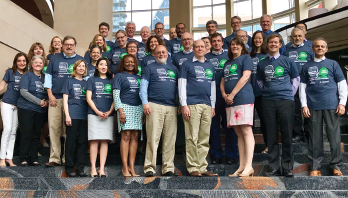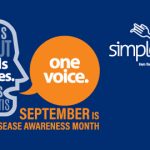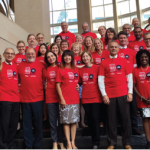
ACR volunteer leaders kick off RDAM 2018.
As rheumatology professionals, we focus on how to achieve better outcomes for our patients: lower disease activity, remission, milder symptoms and prevention of joint damage or serious complications, such as heart disease.
Another outcome is just as important: good quality of life. What can we do to engage our current patients and those at risk for developing rheumatic disease, and inspire them to live healthier, more active lives? How can we create an environment in which people with rheumatic diseases can really live well?
Terry Bradshaw Returns as Our Spokesperson
September is Rheumatic Disease Awareness Month (RDAM). In the past, we’ve used this month to focus on awareness efforts. This year, our message will go a step further. We’ll offer patients some steps they can take to achieve wellness in their lives. We want patients to know that we, their healthcare providers, are their ideal teammates in achieving positive outcomes. We want patients to take action to improve their health and wellness, and we will give them the tools to do so.
Like last year, RDAM advertising and messaging will feature National Football League Hall of Famer Terry Bradshaw as our celebrity spokesman, helping us reach a wide audience. Terry will be featured in a public service announcement (PSA) focused on health and wellness lifestyle messages that includes a call to action for people to sign the ACR’s pledge to live well. We’ll feature messages from the PSA in high-visibility airport advertising and a national print piece in which Terry discusses how he lives well with his rheumatic disease.
Last year, advertising in the world’s busiest airport, Hartsfield-Jackson in Atlanta, was highly successful and generated goodwill from external partners, such as the Centers for Disease Control & Prevention. This drove traffic to the ACR’s Simple Tasks website, and we will use this same approach to promote the 2018 RDAM messages.
We want patients to take action to improve their health & wellness, & we will give them the tools to do so.
What Can You Do?
Encourage your patients to sign the ACR’s pledge to live well with rheumatic disease. Stress the importance of quality of life and wellness, but also let each patient know they can take an active role in achieving their goals.
What’s in the pledge? Simple, concrete action steps patients can take in their daily lives, such as getting some kind of regular exercise, following a balanced diet, taking care of their mental and emotional health, and being an active participant in their own care by following their treatment plan and advocating for their own care.



